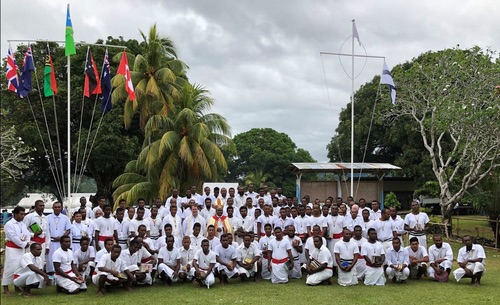
Next week, it is the commemoration of Ini Kopuria, a native Solomon Islander from Guadalcanal, who, in 1925, founded the Melanesian Brotherhood.
What I want to focus on in this blog post is the way that these brothers have vows of poverty, chastity, and obedience but not as life vows. After a three year novitiate, they make these vows (usually on the Feast of St Simon and St Jude) for three years – and these can be renewed.
Some take life vows, but most serve for up to a couple of decades; they then leave, marry and usually live a lay Christian life (some, of course are ordained, either in the time as brothers, or after leaving).
They have about 200 Professed Brothers, and about 300 novices.
In a world in which vowed Religious Life is often shrinking, I am suggesting that acceptance of temporary vows might be yet another way of encouraging this stream within Christianity to flourish.
The Melanesian Brotherhood is Anglican. Within the Roman Catholic Church, two traditions of temporary vows spring to mind. Sisters and Daughters of Charity renew their vows annually (see here, here, here, and here). Within the Carthusians, one of the RC “strictest” orders, there are “Donates” – these do not vow stability, conversio morum, and obedience, as other Carthusians do, but Donates make promises to the monastery of poverty, chastity, and obedience. They retain their personal property. They may regularly renew these promises indefinitely, or they can make a life donation to the monastery.
Returning to the Melanesian Brothers, their prayer discipline consists praying Prime, Morning Prayer, daily Eucharist, Terce, Midday Office (Sext), None, Evening Prayer, and Compline. Their main purpose is evangelistic; they have increasingly been involved in peace work.
Another example of a different form of continuing the stream of Religious Life is found in the Community of St Anselm – young people offering a year in God’s time. And then there are a number of “intentional communities”, often called “New Monasticism”.
How might we continue the wonderful stream of Religious Life in a new way within our new context? Might some Religious Orders vary their constitution to allow for temporary vows, repeated as long as one feels called, to sit alongside life vows? Might new groups be founded that have ongoing temporary vows as part of their charism? What ideas do you have? And what other similar groups already exist?
Do follow:
The Liturgy Facebook Page
The Liturgy Twitter Profile
The Liturgy Instagram
and/or sign up to a not-too-often email



In the Catholic Church, Oratorians also take temporary vows on an annual basis. The other really good example of the practice in Anglicanism is the Oratory of the Good Shepherd.
Thanks, Boniface, for these two examples. Blessings.